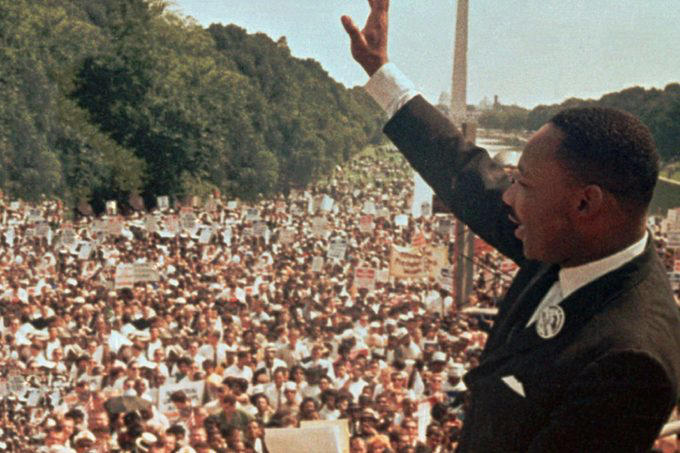12 Conspiracy Theories Surrounding MLK’s Death

A tragedy too soon
On the evening of April 4, 1968, a single rifle shot took the life of 39-year-old civil rights leader, Rev. Dr. Martin Luther King Jr. Many were in complete shock and there are still questions today surrounding these conspiracy theories about the tragedy. Take a look at these rarely seen photos of MLK.
Discrepancies from the outset
When broadcast journalist Walter Cronkite broke the news of Martin Luther King, Jr.’s assassination to the American public, he reported that “police have issued an all-points bulletin for a well-dressed young white man seen running from the scene.” But then the investigation turned to James Earl Ray, a destitute, middle-aged fugitive from Missouri State Penitentiary, where he’d been serving a 20-year sentence for robbery. It was out of this disconnect that the first seeds of doubt as to Ray’s guilt were sown.
The sophisticated escape plan
FBI investigators traced the shot to a boarding house across the street from King’s hotel and discovered what appeared to be a “murder kit” (rifle, binoculars, a newspaper clipping about King’s stay in Memphis) wrapped in a green blanket. Fingerprint evidence pointed to Ray, and the rifle was traced to one of Ray’s known aliases. Ray was captured by authorities at London’s Heathrow Airport, as he was on his way to Brussels and eventually Rhodesia, a place he wanted to emigrate to, according to the book Hellhound on His Trail by Hampton Sides. This led to more doubt: How could this petty criminal who was known for bungling even minor crimes be capable of hatching this intricate escape plan on his own? This is how Martin Luther King’s birthday became a federal holiday.
A plea and a rushed trial
Ray’s lawyer advised him to plead guilty in order to avoid the death penalty, reported the BBC, and he was sentenced to 99 years without a full-on criminal trial with its associated finding-of-facts. Within three days, however, Ray did an about-face, retracting his admission of guilt and claiming he’d been set up by a man named Raul (or Raoul). Ray never received another trial and died in prison in 1998.
The retraction
Ray claimed that Raul, a gun-runner with mafia connections, instructed Ray to purchase the rifle, secure a room across the street from King’s hotel, and then go to a three-hour movie (leaving the rifle behind in the room). It was during this three-hour window during which King was shot. Federal investigators have concluded time and again that Raul didn’t exist. Yet at least one witness was willing to testify that he’d seen Ray with the man described as Raul.
Was there a cover-up?
Dr. King’s wife Coretta Scott always suspected a conspiracy involving the FBI. Georgia State University history professor John McMillian told history.com that Mrs. King’s suspicions had merit. During the 1950s and ’60s, the FBI had not only placed Dr. King, his family, and his associates under surveillance but had engaged in a campaign of harassment against King, which was revealed in FBI memoranda. Mrs. King and the King children maintain that, at the very least, the FBI was not in a position to conduct an unbiased investigation. Don’t miss these 12 crazy conspiracy theories turned out to be true.
The untimely death of Judge Battle
As part of the recanting of his confession, Ray attempted to make a motion before Judge W. Preston Battle of Shelby County Criminal Court (the county in which Memphis is located). But before Judge Battle could consider the motion, he died of a heart attack. His successor, Arthur C. Faquin, denied Ray’s request, as did the Tennessee Supreme Court. In 1997, an ailing Ray’s lawyers cited a state law that allows a new trial when a judge dies while considering a motion. No new trial ever occurred.
The Wallace link
In 1979, the largest government investigation into Dr. King’s murder—which was led by the House of Representatives Select Committee on Assassinations—theorized that Ray committed the killing in the hopes of collecting a $50,000 bounty offered by supporters of segregationist presidential candidate George Wallace. The Committee was unable to prove this theory but did conclude that King’s murder was likely the result of a conspiracy. The same committee investigated the assassination of John F. Kennedy, helping support conspiracy theories and unanswered questions. These are 11 of the biggest lies that made history.
The criminal case of Lloyd Jowers
In 1993, a former Memphis restauranteur by the name of Lloyd Jowers came forward to say that the mafia had paid him $100,000 to plan King’s assassination and that the trigger was pulled by a man named Frank Holt. As a result, Ray, who was ailing, pushed for the case to be reopened and an investigation ensued. But it went nowhere, according to John Campbell, one of the prosecutors involved in this investigation. Campbell admits that Ray—or whoever pulled the trigger—could have had help.
The civil case of Lloyd Jowers
In 1999, the King family sued Lloyd Jowers for Dr. King’s wrongful death and won. A Shelby County jury unanimously found that Jowers and unnamed “others, including governmental agencies,” were responsible for King’s death. The judgment was only a symbolic win for the King family, however, because a civil suit cannot reverse a conviction, and the King family had sought only $100 in damages (to prove they weren’t motivated by financial gain). Everyone should read these inspiring quotes from Dr. Martin Luther King, Jr.
The curious withdrawal of police protection
In 2007, retired Memphis police sergeant Jerry Williams revealed in an interview with Democracy Now that on the day Dr. King was assassinated, the usual security team that would have included Williams himself was not deployed. This has led to speculation that local law enforcement had been involved in, or at least aware of, a conspiracy to murder King.
The KKK conspiracy
In their book The Awful Grace of God, authors Stuart Wexler and Larry Hancock argue that the Ku Klux Klan of Mississippi was responsible for issuing the bounty that led Ray to murder Dr. King. They cite a dozen assassination attempts against King by white supremacist groups and the fact that, on two occasions, the White Knights of Mississippi actually did offer a bounty of up to $100,000. Some have claimed this angle has never been properly investigated.
Did Dr. King have an idea of what was about to happen?
On April 3, 1968, Dr. King delivered what would be his final public speech—and the text has haunted those present, leading them to wonder if King, himself, knew his life was in danger. “There had been so many threats against his life,” noted the Reverend Samuel Billy Kyles, saying that King talked about death, and even his own death, “more that night than we’d heard him talk about it in a long while.” Next, don’t miss these 12 still-unanswered questions about JFK’s assassination.


